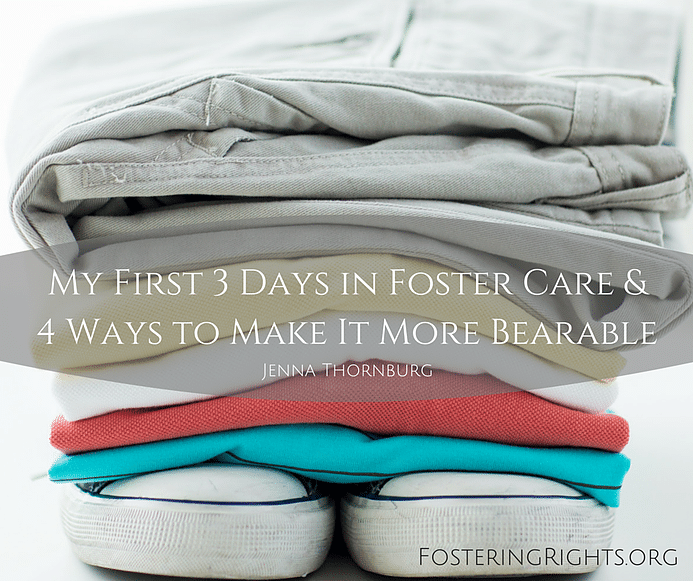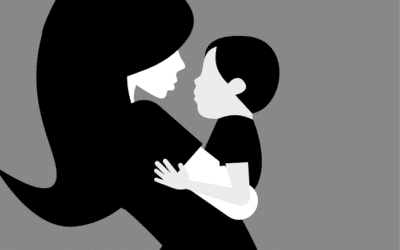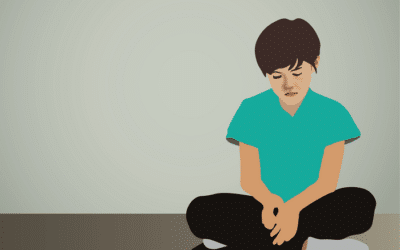by Jenna Thornberg at fosteringrights.org
A current foster parent and former foster child shares her tips below for helping a new foster child feel welcome and comfortable during their first week in your home.
_____________________
I spent 3 days wearing the same clothes to school.
At least my old, worn jeans were appropriate for the weather, but I didn’t have my jacket. I’d left my jacket at home, and I couldn’t go back to get it. I guess that would teach me to be unprepared.
January in the high desert can be cold, but at least it wasn’t snowing. I had my backpack, my longsleeved shirt, one pair of underwear, my jeans, and my tennis shoes. I never minded wearing the same jeans over again, but I felt so dirty having to wear the same underwear for 3 days. It felt like that was the worst part of the whole deal, a punishment for my crimes.
When I met my foster mom, I thought she was nice. She was pregnant and had a few other kids in the house. I was the only girl and the only kid old enough to be in middle school. I was the oldest at my house, too. So, I didn’t mind not having other kids my age around. None of the other kids talked to me, and neither did my foster parents, really.
The whole thing was kind of surreal. I walked around my school with my head down for three days, hoping that even my close friends would just not notice me until I could change my clothes. No one mentioned it to me, but I was sure they knew. They had to know. Everyone paid attention to what you were wearing; it was a key part of 6th grade culture.
When the weekend came, my grandma and my aunts came to pick me up for a visit. I got a new jacket, some clothes, and most importantly, underwear. We didn’t talk about the reason I was in foster care. In fact, neither did my foster mom and I; it felt like the elephant in the room. There I was, a kid in a new world, and everyone just acted like I was where I belonged. It was as if my old world had disappeared into my past and this new world was trying to prove some point by acting super normal.
It didn’t start to feel normal for another 10 years.
I wish I could say that when I went back to live with my family after months in foster care that it was normal again, but I can’t. I wish I could say that when my mom lost custody and I moved in with my aunt and uncle that it was normal, but I can’t. The truth is, I lived in 6 places in just 4 years, and I graduated high school a year early just so I could escape.
I was a gypsy who never learned how to stay in one place with one set of people, because that just wasn’t my life. If you want to hear more of my story, stay tuned. I’d love to share more with you in the weeks to come. It gets better, I promise.
Fast forward 16 years, and there I was, a foster mom. My husband and I took the classes, met with like-minded people, shared stories, and had high hopes to make a difference: to be the change we wanted to see.
Drawing directly on my own experiences, I vowed to do certain things differently. Here are a few things I recommend to make the first few days more bearable for kids in your care:
1. Leave an open line of communication.
This can be as simple as, “If you want to talk about anything, I want to listen.” or “How are you feeling?” or “Do you need anything?” Even if you don’t get an answer, the intent is there. You never know when they will take you up on your offer.
2. Don’t expect anything.
Laying down your family’s lifestyle and rules is important, but don’t expect any child to mold to what you expect in 3 days, 3 weeks, or 3 months. You don’t know what they’ve been through. Some things are easy to change, and some seem insurmountable.
3. Take care of the basics.
Underwear, socks, school supplies, personal care items, clothes. Food they will eat falls into this category too. I always asked if they had a preference for toothpaste, shampoo, a toothbrush, deodorant, and snacks. This gives them a little control over their new world and can provide a small slice of normalcy when everything else is different.
4. Take care of you.
A new person in your home can feel overwhelming on both sides. Making sure you have a support system in place where you can ask for help or advice is important. If you are overwhelmed, how are you going to help a child? Pray, take deep breaths, read a book, take a walk, write, or do something that helps you clear your mind and focus.
I got into quilting as a foster parent. Something about the humming of my machine and the intense focus on something outside of myself just soothes my soul. I spent a lot of time praying at my sewing machine. I wish these things were covered more when we took our foster parent training classes.
I was told that our agency was there to support our family, but in reality, we had to find our own support.
Our agency didn’t always have our family’s best interests in mind. CPS certainly didn’t have our family’s best interests in mind. The therapists we worked with didn’t have my family in mind.
Being a foster parent can feel like you’ve stepped into a crazy world, one where you have no idea what the best move is at every turn. Everyone helping a child in need is a hero in my book, and I hope that together we can learn more and do better all the way around.
___________________________
About Jenna Thornberg
I am a former foster kid who grew up to be a relatively normal, fairly balanced, ferociously protective momma bear of four sweeties who stole my heart the instant I laid eyes on them. My husband and I were foster parents for a year, took some time off to have our fourth child, and plan on adopting in the near future.






